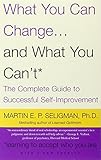Found in 3 comments on Hacker News
tacon · 2015-04-28
· Original
thread
I remember a fascinating book from 1994, "What You Can Change, and What You Can't"[0], about human plasticity, and how malleable we are in various areas. There is a default assumption in our self-help culture that a majority of our characteristics are open to change if we just apply ourselves, have good character, grit, etc. Alas, that does not appear to be the case. Some things are almost trivial to change, such as phobias. A trained practitioner can typically eliminate phobias in hours. On the other hand, at least from a 1994 perspective, some aspects of sexual orientation never change. Seligman presented a layered model of our sexual orientation, and at the very lowest, hardest to change layer is "what gender do I feel like". I can see there being a huge range of variation on internal feeling, depending on which genes are expressed, and how much, how certain hormones are enabled in the growing fetus, etc. We only have to consider hermaphrodites and the huge array of ways that physical sexual development can go awry and extend that to the invisible variations. I remember reading that book when it came out and thinking that must be about the scariest feeling one can have, to be in an X body but every part of me feels like a Y.
[0] http://www.amazon.com/What-You-Change-Cant-Self-Improvement/...
jeremyt · 2013-12-30
· Original
thread
You may think it's wrong, but a professor at the University of Pennsylvania and the former president of the American Psychology Association would disagree with you. There is a chapter in his book (http://www.amazon.com/What-You-Change-Cant-Self-Improvement/...) where he talks about gender identification as nature or nurture.
He argues, quite convincingly, that girls raised as boys still like dolls and boys raised as girls still like firetrucks and bulldozers.
I would recommend the book.

For anyone interested in the topic (and CBT in general) I can highly recomment [What You Can Change and What You Can't - The Complete Guide to Successful Self-Improvement](http://www.amazon.com/What-You-Change-Cant-Self-Improvement/...) by Martin Seligman.
As someone who has recently developed a bit of an obsession with mindfulness/zen/meditation, this book is a good example of the parallels between that and the field of psychology.